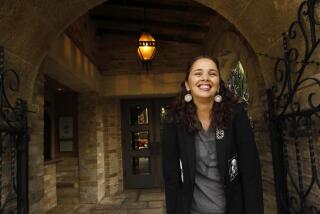STAGE REVIEW : ‘TRAVELER IN THE DARK’ AT TAPER
The first thing you see on entering the Mark Taper Forum for “Traveler in the Dark” is Ming Cho Lee’s set, and it is so true that it takes your breath away. An old frame house with porch steps slightly askew, a stand of bare trees, a floor of dead leaves, a ring of stones that used to be a fence. . . .
Where are we? New Hampshire? Kentucky? Somewhere out in the country, anyway, in late fall or early spring. (The leaves would be wet underneath if we could touch them.) If this is a farm, the forest is ready to take it back.
You wouldn’t be surprised if a squirrel ran by. Instead, the lights go down, and the story begins. It concerns the man who grew up in this house (Len Cariou), home for one of those funerals that force us to examine the road not taken. It is a thoughtful and serious play, but it leaves the viewer feeling a bit like a traveler in the dark himself.
On the one hand, there is playwright Marsha Norman’s intention to show us a soul in crisis. Cariou is a famous big-city surgeon. As the son of a minister (Claude Akins), he has had to wrestle with the idea of God, and he has decided that God, if he exists, couldn’t care less about what happens to man.
In effect, our surgeon had become his own god, and his world has gone very well. Now, however, he has seen an old friend die under his knife: a woman who devoted her life to him as his head nurse, a woman he perhaps should have married. If Cariou is God, then God doesn’t know what he is doing.
Suddenly Cariou’s universe is a black hole. What can he do? He will make things right. He will leave the woman he did marry (Deborah May). That will propitiate the woman he betrayed. He will be a companion to his little son (Scott Grimes). That will make up for his own neglected childhood. With the world in place again, he will find peace.
Cariou does find peace by the end of the play, but not through his own agency. This seems to be playwright Norman’s thought: that one has to stop trying to carry the universe by himself and must accept the role that he was designed to play, even when it’s not too flattering.
One of the subtlest things in Cariou’s performance is his air of being slightly ticked-off to discover that his loved ones regard him as a highly gifted man with no gift for people. Worse, they forgive him for this. He had considered himself their judge, and they have been judging him all along.
Still he is whole again. All this makes good psychological sense, but it subtly undercuts the play’s metaphysical pretensions, and even more so its attempt to be a truly wrenching study of spiritual travail.
That’s the basic problem with “Traveler in the Dark.” We can’t shrug off what our hero is going through, particularly with Cariou there to convey it. As we know from “Sweeney Todd,” he’s an expert in black moods, moments of universal disgust. We feel our surgeon’s pain.
But while part of Norman seems to be setting him up as a tragic hero, another part seems to view him as an immature and self-centered man undergoing a fairly common grief process. It’s interesting that Deborah May as his wife doesn’t fight his plan for a divorce more strenuously. It’s also sensible. She knows that this is his grief and his self-blame talking. The mood will pass.
In effect, this is exactly what happens--not a very dramatic process. Our hero comes to his senses (aided by the revelation that his dead friend Mavis never blamed him for being what he couldn’t help being), and he rejoins the family circle, with hugs all around.
A little pat, after all that rhetoric about Faith and what’s Out There beyond the stars. And something in the way the piece is played under Gordon Davidson’s direction reflects that patness.
A conversation between Cariou and his son about God would seem to be meant as a cover for what they’re both thinking: What’s it going to be like to leave home? In the playing, we see none of that concern, nor much about God either. It’s a pleasant father-and-son bull session under the stars.
Again, May so successfully covers her anxiety about whether Cariou might be leaving that it’s not clear if she’s feeling any significant anxiety at all. Perhaps it would be a relief to be rid of such a sullen and self-struck fellow.
And Akins makes the father your typical soft-centered, almost whimsical stage clerygyman--not a zealot who has had to learn wisdom and kindness through his own losses. This makes Cariou look twice as obtuse when he attacks the father for having neglected him as a child. We can’t see the father as having been that kind of man at all.
“Traveler in the Dark” leaves us confused. It makes large, dark gestures, but its tone is oddly cozy. It is getting at something that isn’t platitudinous, but platitudes are all that seem to come out. Still, there will always be the memory of that wondrous set, under Marilyn Rennagel’s wintry lighting--a clearing in a forest rife with secrets.
‘TRAVELER IN THE DARK’
Marsha Norman’s play, presented by Center Theatre Group/Mark Taper Forum. Director Gordon Davidson. Set Ming Cho Lee. Costumes Susan Denison. Lighting Marilyn Rennagel. With Len Cariou, Deborah May, Scott Grimes, Claude Akins. Plays Tuesdays-Saturdays at 8 p.m., Sundays at 7:30 p.m., with Saturday and Sunday matinees at 2:30. Closes March 10. Tickets $15.50-$21.50. 135 N. Grand Ave. 972-7654.
More to Read
The biggest entertainment stories
Get our big stories about Hollywood, film, television, music, arts, culture and more right in your inbox as soon as they publish.
You may occasionally receive promotional content from the Los Angeles Times.










